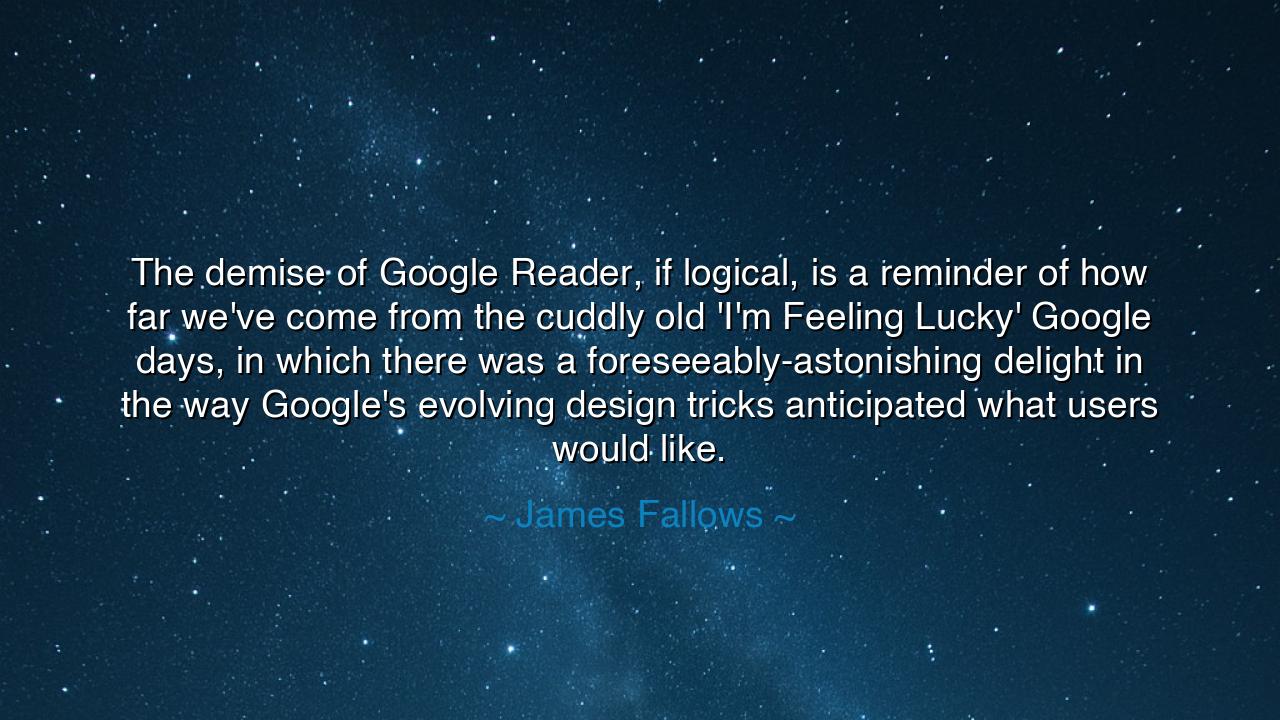
The demise of Google Reader, if logical, is a reminder of how far
The demise of Google Reader, if logical, is a reminder of how far we've come from the cuddly old 'I'm Feeling Lucky' Google days, in which there was a foreseeably-astonishing delight in the way Google's evolving design tricks anticipated what users would like.






“The demise of Google Reader, if logical, is a reminder of how far we've come from the cuddly old ‘I'm Feeling Lucky’ Google days, in which there was a foreseeably-astonishing delight in the way Google's evolving design tricks anticipated what users would like.” — James Fallows
Thus spoke James Fallows, the wise observer of modern change, chronicler of technology and culture, who saw in the death of Google Reader not merely the end of a product, but the passing of an age. His words ring like a eulogy — not only for a tool of reading, but for a moment in history when the digital world still felt human, curious, and full of delight. He mourns not a machine, but a spirit: that early sense of wonder, when technology served imagination, and not the other way around.
When Fallows speaks of “the cuddly old ‘I’m Feeling Lucky’ Google days,” he recalls a gentler dawn of the internet — an era when curiosity, not control, guided innovation. That phrase, printed on a simple button, captured the innocence of exploration. To click “I’m Feeling Lucky” was to leap into the unknown with trust — to believe that behind the vast, unseen engine of information lay a kind of benevolent intelligence, eager to surprise and delight. But as time passed, that spirit of play gave way to one of precision, prediction, and profit. The world that once offered delightful discovery now offers only targeted certainty.
Google Reader, once a humble companion for seekers of knowledge, represented that earlier era’s faith in the user’s mind. It was a tool of quiet reflection — a gathering place for writers, thinkers, and readers who sought to shape their own streams of information, rather than be shaped by them. It asked nothing more of you than your curiosity. Yet in time, it was deemed obsolete, sacrificed to the gods of efficiency and engagement. Fallows calls this “logical,” but with the sadness of one who knows that logic alone cannot sustain the soul of progress.
Consider, my children, the fate of other inventions that shared this path. In the ancient world, the Library of Alexandria stood as the greatest collection of human wisdom. When it burned, scholars mourned not only the loss of scrolls, but the loss of the human spirit of inquiry that the library symbolized. So too, Fallows suggests, the death of Google Reader marks not merely the closing of a service, but the dimming of a cultural flame — the idea that technology should nourish curiosity rather than consume attention.
When he writes of “evolving design tricks that anticipated what users would like,” Fallows is not speaking only of clever engineering. He speaks of an age when creators sought to understand their users, not to exploit them. It was an era of mutual respect between maker and seeker — a partnership of trust. Now, as algorithms grow sharper, the relationship has changed. The machine no longer anticipates with delight; it manipulates with precision. It no longer invites discovery; it predicts and confines. The gift of surprise — that sacred spark of learning — has been replaced by the dull comfort of familiarity.
And yet, there is wisdom in this mourning. Fallows’s reflection calls us to remember what made the early digital age so wondrous: its humanity. It was not the brilliance of code alone, but the spirit of generosity behind it — the desire to connect minds, to share, to enlighten. If that spirit is lost, then even the most advanced machine becomes an empty idol. The ancient philosophers taught that wisdom begins in wonder; so too must technology. The tools of the mind must never forget the heart that wields them.
Therefore, my children, take heed of this lesson: progress without wonder is a barren path. Let not convenience dull your curiosity, nor automation replace your agency. Seek again that “foreseeably-astonishing delight” that Fallows speaks of — the joy of discovery unprompted, the thrill of finding what you did not know you needed. For in that joy lies the true promise of knowledge: not to be fed what we expect, but to be surprised by truth.
Thus, let this teaching endure: though Google Reader is gone, and the world has grown more mechanical, the spirit it embodied need not die. Keep alive the flame of curiosity. Cherish tools that serve your mind, not those that seek to master it. For as long as you hold to that — as long as you continue to explore with open eyes and grateful heart — then even in a world ruled by algorithms, you shall remain, as the ancients would say, truly human.






AAdministratorAdministrator
Welcome, honored guests. Please leave a comment, we will respond soon